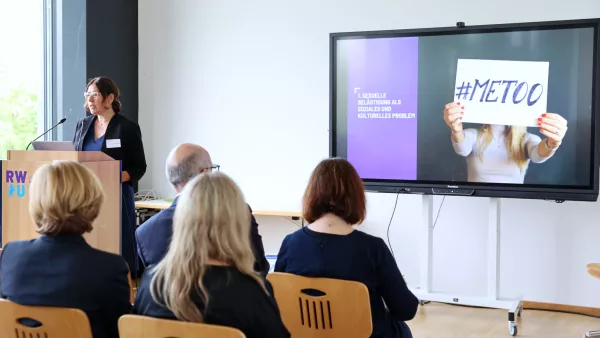
Weingarten - The Euregio Ring Conference took place at RWU this year under the motto "Together active against sexual harassment". In addition to three guest lectures and in-depth workshops, participants were able to visit the "Art against Abuse" exhibition that had opened the day before in the foyer of the RWU main building.
The Ringtagung is a cooperative event between three universities from the border triangle: students, lecturers and interested parties from RWU in Weingarten, the University of Applied Sciences Vorarlberg and the University of Applied Sciences Eastern Switzerland took part. It is alternately organized by the social work department there and is thematically oriented towards current topics from science, business and society.
Violence against women is not decreasing despite measures
"You only see what you know. And as universities, we have the task of producing knowledge and passing it on. This knowledge leads to seeing, looking and ultimately to improvement," said the Rector of RWU, Professor Dr. Thomas Spägele, in his welcoming address.
Dr. Monika Schröttle, Professor of Social Work and Participation at RWU, gave the opening lecture. She highlighted the research situation from the USA and Germany on sexual harassment at universities, risk factors and possible measures. Even though much has already been done, according to Monika Schröttle, "violence against women has not decreased. It is a social and cultural problem." Recent counter-movements and backlashes, including from the USA, present everyone with new challenges in terms of how to deal with the issue.
Dr. Anke Lipinsky from the GESIS-Leibniz Institute for Social Sciences presented a study that underlined the fact that sexual harassment and violence are not isolated incidents. "It is a systemic problem, we all know about the power differentials and we need to create evidence," said Lipinsky. Nathalie Schlenzka, Head of the Research and Networking Unit at the Federal Anti-Discrimination Agency, made it clear in her keynote speech that discrimination and harassment "is always about the effect on those affected and not about the intention of the perpetrators." Universities must therefore intervene quickly with sanctions in order to better support those affected, added Michaela Spandau, BW's liaison lawyer for sexualized harassment in higher education and cultural institutions.
Workshops and exhibition "Art against abuse"
In the afternoon, guests had the opportunity to take part in one of the workshops on offer. In these, the leaders explored key topics in greater depth and worked with the participants to develop specific approaches and perspectives. The workshops focused on different topics: From stereotypical thought patterns and unconscious biases that can influence sexual harassment in the workplace, to recognizing and actively tackling sexism at universities, to the role of proximity-distance-grabbing areas and their power effects in everyday (university) life.
Based on the touring exhibition "Art against Abuse", which shows photographs of places of sexual abuse of children and young people, a workshop was held under the direction of artist Nessi Nezilla and Professor Dr. Julia Wege. The participants explored the topic of sexual harassment through photography.
Here you can go to the photo gallery
Text: Kathrin Wöhrle
Downloads
- Pressemitteilung zur Euregio-Ringtagung 2025 an der RWU